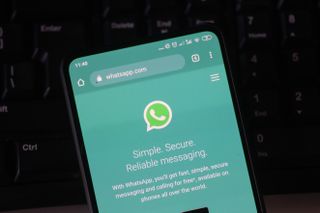WhatsApp full encryption ban could be coming — here's how to stay private
EU may ban end-to-end encryption under proposed rules

The European Union (EU) is currently in the planning stages to stop messaging apps like Signal, WhatsApp, Facebook Messenger and Apple's iMessage from using end-to-end encryption.
According to a leaked memo, EU officials understand the privacy benefits of encryption but are concerned that it also makes criminal investigations more difficult. The move could lead to more people seeking out the best VPN to ensure all of their app messaging is kept encrypted.
- The best Black Friday deals you can already get
- VPN: Everything you'll ever need to know
- Just in: The MacBook Air M1 looks amazing — but it's missing one big feature
In the memo — as reported by ITPro — the EU describes encryption as a “necessary means of protecting fundamental rights and the digital security of governments, industry and society”.
But the EU also warns that it also needs to “ensure the ability of competent authorities in the area of security and criminal justice, e.g. law enforcement and judicial authorities, to exercise their lawful powers, both online and offline.”
The officials go on to explain in the memo how messaging apps with built-in end-to-end encryption are being abused by criminals and why law-enforcement officials need to be able to access these services in their investigations.
“At the same time law enforcement is increasingly dependent on access to electronic evidence to effectively fight terrorism, organised crime, child sexual abuse (particularly its online aspects), as well as a variety of cyber-enabled crimes,” wrote the EU.
“For competent authorities, access to electronic evidence is not only essential to conduct successful investigations and thereby bring criminals to justice, but also to protect victims and help ensure security.”
Sign up to get the BEST of Tom's Guide direct to your inbox.
Here at Tom’s Guide our expert editors are committed to bringing you the best news, reviews and guides to help you stay informed and ahead of the curve!
Many apps send messages that are encrypted between the user's device and the messaging provider's servers. In many cases, the provider can decrypt the messages, which means law enforcement can get them using normal legal channels.
But end-to-end-encryption ensures that the message data stays encrypted as it passes through the provider's servers, with only the message recipient able to decrypt it. As a result, no one else, including law enforcement, can read a message unless they unlock either the sender's or the recipient's device.
Bloc-wide security concerns
The memo discusses how the use of end-to-end encryption in messaging apps makes it harder for law-enforcement officials to conduct their investigations.
It explains that “there are instances where encryption renders analysis of the content of communications in the framework of access to electronic evidence extremely challenging or practically impossible despite the fact that the access to such data would be lawful.
“Independently of the technological environment of the day, it is therefore essential to preserve the powers of competent authorities in the area of security and criminal justice through lawful access to carry out their tasks, as prescribed and authorised by law.”
Finding a solution
Therefore, the EU believes a solution that protects fundamental data privacy rights but also allows law enforcement to keep the public safe is needed.
The document adds: “Moving forward, the European Union strives to establish an active discussion with the technology industry, while associating research and academia, to ensure the continued implementation and use of strong encryption technology."
If a ban on end-to-end-encrypted messaging apps is introduced by the EU, the adoption of VPN services could increase across Europe as people look for other ways to secure their communications.
By installing and using mobile VPNs, smartphone users are still able to encrypt all web traffic and data that they send and receive, at least up to the point where the communications interface with the VPN provider's servers.
This is one reason that the popularity of VPNs has grown so massively in recent years, with people ensuring that their personal information is kept private when using public Wi-Fi.
- Read more: discover the best iPhone VPN and Android VPN apps
Nicholas Fearn is a freelance technology journalist and copywriter from the Welsh valleys. His work has appeared in publications such as the FT, the Independent, the Daily Telegraph, The Next Web, T3, Android Central, Computer Weekly, and many others. He also happens to be a diehard Mariah Carey fan!
-
merarischroeder How ridiculous. With that logic, they should also ban casinos, motels, shipping, trucks, second hand sales, the internet, food, air, and water. Criminals also use those.Reply
